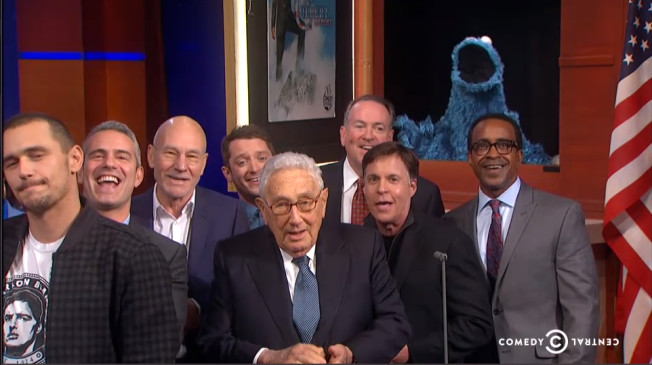(1) YOUNG PEOPLE READ OLD SFF. The panel is getting younger. “This week actual high schooler (for about two more months) Raya joins the crew, says James Davis Nicoll. “Like most of the others, she’s familiar with recent genre but not the older material.”
Her first assignment: Joan D. Vinge’s “A View From A Height.”.
1978’s Hugo Nominee “A View From a Height” first appeared in the June 1978 issue of Analog. It was selected for Terry Carr’s The Best Science Fiction of the Year, #8, Gardner Dozois’ Best Science Fiction Stories of the Year: Eighth Annual Collection, Pamela Sargent’s Women of Wonder, the Classic Years: Science Fiction by Women from the 1940s to the 1970s, as well as other collections and anthologies. The theme of irreversible life decisions cast into doubt by new revelations seemed to me one that would have aged well. Let’s see if I was right.
(2) ORWELL PRIZE. The Orwell Prize for Books 2017 Longlist consists almost entirely of nonfiction, with one exception of genre interest —
The Power by Naomi Alderman (Viking)
It starts with teenage girls. At 14 or 15, the age when in our present world girls are waking to an awareness of their own sexuality tangled up in all the ways society will seek to stifle or exploit it, Alderman has them come alive to the thrill of pure power: the ability to hurt or even kill by releasing electrical jolts from their fingertips. “Something’s happening. The blood is pounding in her ears. A prickling feeling is spreading along her back, over her shoulders, along her collarbone. It’s saying: you can do it. It’s saying: you’re strong.”
The shortlist will be announced on May 15, and the winner on June 8.
(3) MAKING MUSIC. Sammy Cahn (“Come Fly With Me,” “Three Coins in the Fountain”) used to tell people he got his inspiration when the check arrived. Disney songwriter Alan Menken says he needs a little more.
“Where does it start and where does it end, and what’s the title and what song might it remind us of? …” Menken asks. “A million questions and only then will I sit and … start to play the piano.”
Menken’s musical chops were developed off-Broadway. He and lyricist Howard Ashman’s success with the 1982 comedy rock horror musical Little Shop of Horrors got Hollywood’s attention.
But when he first started working at Disney animation, he had some reservations. “I can’t tell you how many people said to me: Ugh, man, take a powder. Nobody takes animated musicals seriously,” he recalls.
Menken and Ashman’s first musical film — The Little Mermaid animation in 1989 — was a life saver for Disney. It lifted the studio out of a slump, and led to more big hits.
(4) UNSPOKEN MEETS UNSPEAKABLE. About a currently-running horror movie:
The new film, Get Out, defies easy classification. Though it has funny moments, it’s primarily a horror film, with racial anxiety at its center. Writer-director Jordan Peele tells Fresh Air‘s Terry Gross that he thinks of Get Out as a “social thriller.”
The movie tells the story of a young black man named Chris whose white girlfriend, Rose, takes him to meet her parents for the first time — without first telling them he’s black. Rose’s parents go out of their way to show Chris how open minded they are, but there’s something suspicious in the liberal facade they present. The film takes several twists and turns (which we won’t spoil here) as Chris figures out what is going on.
Peele wanted the audience, regardless of race, to see the subtle racism through Chris’ eyes. “It was very important to me to just get the entire audience in touch in some way with the fears inherent [in] being black in this country,” Peele says. “Part of being black in this country, and I presume being any minority, is constantly being told that … we’re seeing racism where there just isn’t racism.”
(5) DOPPLEGANGERS. NPR’s “Movie Twins? Weirdly Similar Films That Came Out Within Months Of Each Other” cites many genre examples.
The new movie Life, which opens March 24, is about astronauts who discover an alien life form and live to regret it. You could say exactly the same thing about Alien: Covenant, which was originally scheduled to open the following Friday — until someone realized that was a recipe for box-office disaster. Alien: Covenant will now open in early May, and that close call, crazy as it is, isn’t uncommon in Hollywood.
Rival studios often stare each other down, refusing to blink, in showdowns that didn’t need to happen. In 1998, Earth-snuffing asteroids were blown up in the nick of time by nuclear warheads not once, but twice: with much electronic beeping and enormous special effects in Armageddon, and slightly higher beeping and enormous special effects in Deep Impact. That same year, animated insects skittered onto movie screens in both Antz and A Bug’s Life — and all of that just one year after dueling lava flows erupted in Dante’s Peak and Volcano.
(6) ON THE CAMPAIGN TRAIL. Congressional candidate Brianna Wu was interviewed in New York Times Magazine.
Do you really think Democrats need to take pages from the Trump playbook? I would say we need to speak with our hearts more. The typical Democratic way of talking about, say, wealth inequality is to bring out Robert Reich, who will give a cute academic presentation. But at the core, wealth inequality is about people’s dreams for their families and their children. It’s friends my age who are dying to have a child and don’t know if they can afford to do that. The Democratic Party tends to have this hypereducated ruling-class mentality, and we need to realize that’s not making us connect with a lot of voters.
Considering the internet culture leading up to the election, some have said 2016 was a banner year for internet trolls. Do you think that’s accurate? Absolutely. I’ve rarely talked about Obama’s share of the blame for the rise of the alt-right and Gamergate. I had two separate calls with the White House, and they were telling me they had some ideas they were putting together to address Gamergate without needing to go through Congress, and nothing came of it. And what happened is a lot of people learned that there are no consequences to harassing women. If I play Grand Theft Auto and I decide to blow up a police helicopter, there are going to be consequences to that; eventually I’m going to go to jail and maybe pay 100 virtual dollars. We don’t even have that…..
In the aftermath of Gamergate, you said that you and the other women who were harassed “did everything right, and the system failed us.” Now you’re saying you want to be a part of that system. Do you think you can make changes inside of it? To me, the only way to get further gains on these issues is for more women to be represented in Congress. I don’t even care if it was a higher percentage of Republican women: I genuinely believe that if that number were closer to 50-50, we wouldn’t have ludicrous policies like the Hyde Amendment going through and devastating women’s access to reproductive health care. I want women out there to look at how incredibly unqualified Trump is and then ask themselves: “What on earth is holding you back? Do you think you don’t measure up with Donald Trump in the White House?”
(7) CHARACTERIZATION. Marko Kloos, whose Angles of Attack won two Rampant Manticore awards, explains how the novel came to have a gay Russian space marine.
Truth be told, when I wrote Dmitry, I didn’t know he was gay until I got to the scene in ANGLES OF ATTACK where Dmitry and young master Andrew have a drink together and show each other pictures of their main squeezes, as soldiers do when they have downtime and some alcohol in front of them. I’m not the kind of writer who claims that my characters have their own will—they do what I tell them to, goddammit, because I’m the master of their universe—but that was a moment where a character revealed a little detail that I hadn’t intentionally sketched out, but that felt natural and proper. Dmitry pulled out the picture of his spouse, and my brain just went, “He has a husband. Huh, Of course he does.”
So no, I don’t sit down with a character creation sheet and a checklist for Maximum Diversity(tm) and threw in a gay character to advance an agenda, score Social Justice Warrior brownie points, or engage in virtue-signaling. Dmitry is gay because he is, and with all the crap these soldiers have to deal with in their alien-besieged dystopia, I found it appropriate that at the very least, showing someone else a picture of your same-sex spouse is not worthy of special commentary above and beyond “Nice picture” in that version of the future.
(8) CHOOSING THE POWER. Abigail Nussbaum shares the Best Novel and Campbell Award categories on her Hugo nominating ballot. The first of her four novel picks is –
- The Power by Naomi Alderman (review) – As I’ve said, this feels more like a Clarke award book than a Hugo award one, but nevertheless Alderman’s chilling, Handmaid’s Tale-esque story about a world in which women suddenly develop the ability to shoot bolts of electricity from their bodies, upending the world’s balance of violent potential, is one of the most interesting and thought-provoking works of science fiction I’ve read in some time. What’s most interesting about The Power is that while it is undeniably a book about gender and the role that violence plays in maintaining gender roles, that’s not its main interest. What Alderman is doing with her premise is using it to discuss the role that violence and the use of force play in organizing our society, even when we pretend to be beyond them. That feels like a vital issue at this point in time.
(9) SIR POT. Mashable reports that Sir Patrick Stewart has announced that he has used medical marijuana for several years to help with his arthritis. Stewart made this announcement to support an Oxford University proposal calling for more research into marijuana’s medical benefits. The piece is called “Patrick Stewart reveals that he uses medical marijuana every day”.
But Stewart isn’t rolling up a joint or hitting the bong, he says he typically uses sprays, ointments and edibles.
“I purchased an ointment, spray and edibles. The ointment, while providing some relief from the discomfort, was too greasy to use during daytime and so I only use it at night.”
Patrick went on to describe how he uses his medicine, later adding that he can now make a fist with his hand, which was impossible for him to do before using cannabis.
As the Captain might say, “Make it grow!”
(10) NEW PIXAR MOVIE. Coco, a Disney-Pixar movie, opens in US theatres in 3D on November 22.
(11) EYE-SEARING. Starz new American Gods trailer is violent and gory. Beware!
[Thanks to Chip Hitchcock, Martin Morse Wooster, and John King Tarpinian for some of these stories.Title credit goes to File 770 contributing editor of the day StephenfromOttawa.]







